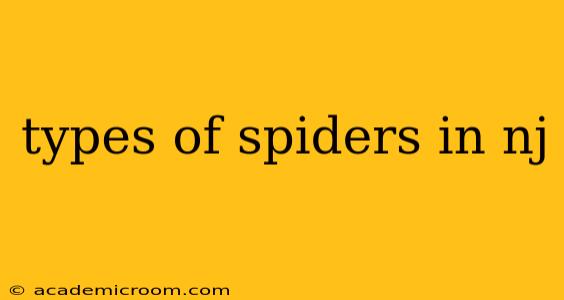New Jersey, with its diverse landscapes ranging from coastal areas to forests and suburban neighborhoods, boasts a rich variety of spider species. While most are harmless, understanding the types of spiders you might encounter is crucial for safety and peace of mind. This comprehensive guide explores common and notable spiders found in NJ, addressing frequently asked questions to help you identify and coexist peacefully with these eight-legged creatures.
What are the most common spiders in NJ?
Several spider species are prevalent throughout New Jersey. The most frequently encountered include:
-
American House Spider ( Parasteatoda tepidariorum): These are small, tan spiders often found indoors, creating messy webs in corners and crevices. They're generally harmless to humans.
-
Orb Weavers (Family Araneidae): Many orb-weaver species exist in NJ. They're known for their beautiful, spiral-shaped webs. While their bite is mildly venomous, it rarely causes significant harm to humans. Common examples include the garden spider (Argiope aurantia) with its distinctive yellow and black markings, and various other species that vary in size and coloration.
-
Jumping Spiders (Family Salticidae): These small, agile spiders are excellent hunters, recognized by their large forward-facing eyes and jumping ability. They are not considered dangerous to humans.
-
Wolf Spiders (Family Lycosidae): These are larger, hairy spiders that are active hunters, often found outdoors in gardens and under rocks. They're not aggressive, but their bite can be painful, similar to a bee sting.
-
Cellar Spiders (Family Pholcidae): Often called "daddy longlegs," these spiders are characterized by their long, thin legs and haphazard webs. They are generally harmless and are known to prey on other spiders, including some considered more dangerous.
Are there any poisonous spiders in New Jersey?
While many spiders in NJ possess venom, only the Black Widow (Latrodectus species)* and the Brown Recluse (Loxosceles reclusa) are considered medically significant.
-
Black Widows: These spiders are identifiable by their shiny black bodies and a distinctive red hourglass marking on their abdomen. Their bite can cause severe pain, muscle cramps, and nausea, requiring medical attention. Black widows are less common in northern New Jersey but may be found in sheltered areas like woodpiles and sheds.
-
Brown Recluses: Brown recluses are rare in New Jersey, though not unheard of. Their geographic range primarily lies further west and south. They are characterized by a dark violin-shaped marking on their cephalothorax. Their bite can cause necrotic lesions (tissue death) requiring medical treatment.
What is the most dangerous spider in New Jersey?
The black widow is considered the most dangerous spider in New Jersey due to the potential severity of its venom. While rarely fatal, its bite can cause significant pain and systemic effects that necessitate medical attention.
How can I identify spiders in my home?
Accurate spider identification can be challenging, even for experts. Take clear photos of the spider from multiple angles, noting its size, color, body shape, leg length, and web type (if present). Online resources like field guides and spider identification websites can help, but if unsure, it's best to err on the side of caution and avoid handling the spider.
What should I do if I get bitten by a spider in NJ?
If bitten by a spider, the immediate steps are:
- Clean the bite area: Wash gently with soap and water.
- Apply a cold compress: To reduce swelling and pain.
- Monitor for symptoms: Watch for increasing pain, swelling, redness, or systemic symptoms like nausea, muscle cramps, or fever.
- Seek medical attention: If symptoms worsen or you suspect a bite from a black widow or brown recluse, seek immediate medical help.
What attracts spiders to my house?
Spiders are attracted to places where they can find food (other insects) and shelter. Keeping your home clean, reducing clutter, sealing cracks and gaps, and eliminating sources of food (e.g., eliminating other insect pests) can help deter spiders.
This guide provides a general overview of common spiders in New Jersey. Remember that spider identification can be complex, and it's always best to avoid handling spiders unless you are absolutely certain of their species and are equipped with the proper safety measures. If you have concerns about a spider bite or identifying a potentially dangerous spider, consulting a medical professional or entomologist is highly recommended.
